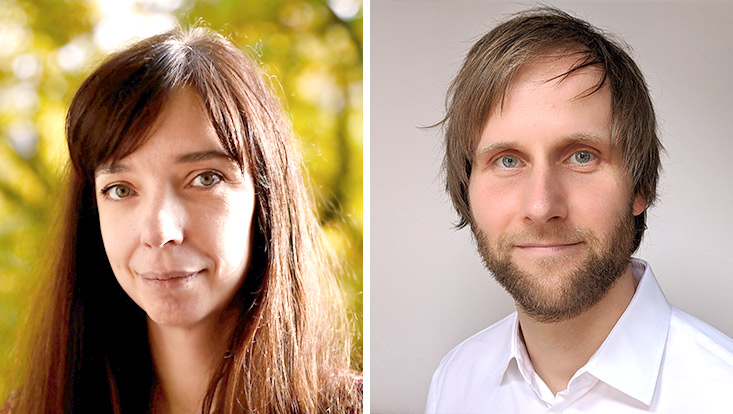New Grants from the Ideas and Venture FundBetter Understanding Human Emotion and the Immune System
25 July 2022, by Christina Krätzig

Photo: Private
In 2022, 23 researchers at Universität Hamburg—University of Excellence will receive funding from the Ideas and Venture Fund. The researchers will use this to prepare third-party-funded projects suited to one of the University’s profile initiatives or emerging fields. In total, the University will have around €842,000 at its disposal. Here, we introduce 3 projects.
Prof. Dr. Esther Diekhof: Why do some people get sick while others don’t?
When surrounded by people with an infectious disease, not everyone gets sick. Some remain puzzlingly free from infection. This previously mysterious phenomenon is the subject of investigation by human biologist and neuroscientist Esther Diekhof and her team. “We have found considerable indications that certain immune defenses respond to visual cues, even before direct contact with an infected person. If these mechanisms respond pro-actively to the mere sight of a person who is sick, then their host is probably well-protected from infection,” explains the junior professor from Universität Hamburg.
Now, equipped with €26,000 from the Ideas and Venture Fund, Prof. Diekhof is looking for answers. She wants to create films and photographs of people who are visibly ill, and then show these to a range of test subjects. While doing this, she measures the cognitive response to this stimuli, the release of antibodies in saliva and the brain activity of her test subjects using MRI scans. “Ideally, this way, we will not only get further evidence for the preventative activation of the immune system through purely visual stimulation, but also find evidence of which areas of the brain are involved in the immune process, and why this mechanism varies in strength from person to person,” she explains.
Should her preliminary study proceed well, she is planning to make a larger application for more funding from the DFG to further her research. Her proposed research is based in the emerging field of Infection Research at Universität Hamburg.
Dr. Jens Lange: What are emotions, and why do we sometimes have multiple emotions at once?
Everyone knows what emotions are—until they have to define them. So runs the joke, well-known in the world of psychology, but, as with all jokes, there is a grain of truth to it: we still do not have a generally applicable definition of emotions. Beyond this, there are many questions still open in terms of human emotions: What is more likely to trigger emotions: general issues, concrete things, or specific situations? How to emotions amplify in groups of people? Or why does a specific trigger cause different emotions in different people?
“To develop effective intervention methods, we first need to understand exactly what emotions are. That is the only way we can, for example, provide long-term assistance to people suffering from depression, or prevent extreme, previously mysterious phenomena such as mass panic,” explains Dr. Jens Lange, research assistant at the Institute for Psychology.
With the almost €4,000 from Universität Hamburg’s Ideas and Venture Fund, they are intending to show test subjects a range of videos of natural catastrophes, and examine whether they trigger the same emotions at the same time, and how that works exactly. They also want to survey test subjects about their current feelings at different times throughout their everyday activities. In so doing, he is testing an experiment design that, if it works, will be an important component of externally funded research, for example as part of an ERC Starting Grant. https://www.eubuero.de/erc-stg.htm
Dr. Lange’s research is based in the University’s profile initiative Mechanisms of Change.
Additional funding line digitalization, artificial intelligence, and data science.
Prof. Dr. Natalia Filatkina und Dr. Julia Hübner:
How did ordinary people speak in the Early Modern Period?
European languages had not been standardized in the fifteenth, sixteenth, and seventeenth centuries. There were—even in German—no fixed rules, no Duden (the standard German dictionary), and no binding grammar rules as we know them today.

Prof. Dr. Filatkina

Dr. Hübner
“We know how educated people expressed themselves, through their writing, but how ordinary people thought about language, how they imagined good German or good French, is much less well-known,” explains Prof. Dr. Natalia Filatkina. Working with Dr. Julia Hübner, she will now investigate this question, using 500 foreign language works. Tradesmen, poorer members of the nobility, and other travelers used these books to learn foreign languages. “They were cheaply produced language guides, printed on very thin paper, designed to be carried in your pocket. They did however contain sample dialogs, which tell us a lot about the use of language at the time." explains Filatkina.
The researchers are using almost €50,000 from the Ideas and Venture Fund to prepare a long-term research proposal: They are looking through suitable works, to establish their rules, conduct full-text digital scans, and break down the texts according to specific characteristics. “This is the requirement for using these previously underutilized sources objectively for future research, and obtaining verifiable research results from them,” explains Filatkina. If the planned external funding comes through, the project should go for at least 12 years.
The Ideas and Venture Fund was created as part of the Excellence Strategy of the Federal and State Governments.
University of Excellence portal
See the new portal for the University of Excellence. This also provides an overview of all available funding.


